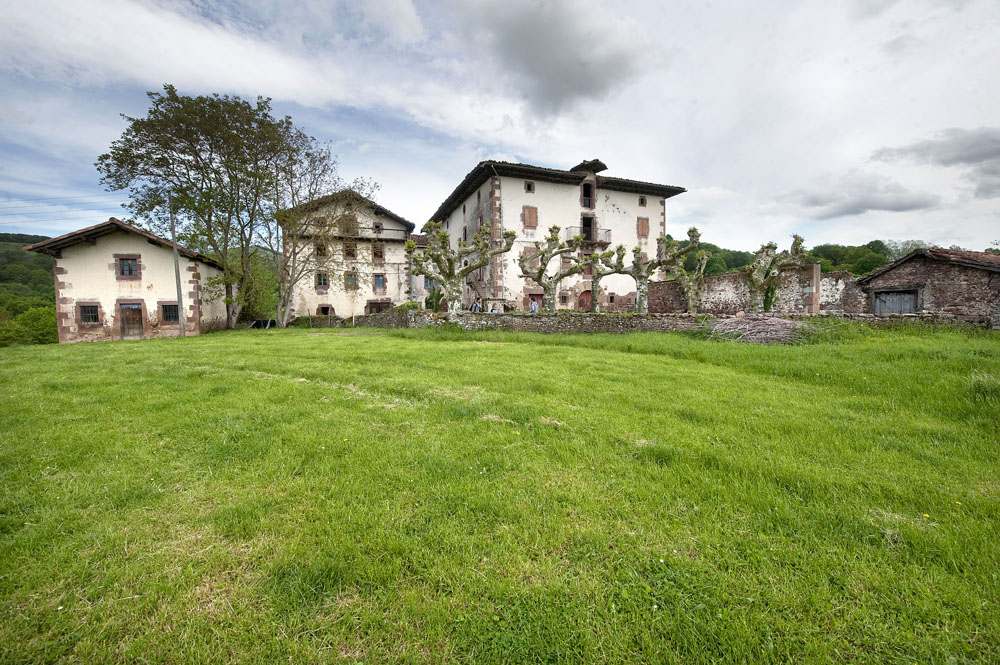Who wants to kill the black novel in Basque in Baztan?
- On 6 February, for an hour and twenty minutes, a fiction book was debated in the Committee on Education of the Parliament of Navarra. UPN has created a curious situation, fine-tuning a novel that the 4th ESO students of the Lekaroz Institute have read. After Ernesto Prat Urzainki's Telleria, what? (Elkar, 2017) is a black genre novel, and the regionalist right has denounced that the center’s teachers have used it to “impose ideological and political positions.” But, from the analysis of the case, we have found other clues: an urban operation in the valley and a successful series of novels in Spanish that may be their accomplices.

This is a story, it's not a black novel, but it still has its plots and its characters. The first, the mother of a student from the Lekaroz Institute, also concedes from UPN: Isabel Olave. He met with the director of the center twice before Christmas, after Telleria, what? I wanted clarification on their incorporation into the curriculum. The director explained that it was a decision of the Euskera department of the center, to see if he wanted to meet with that department. Olave rejects it. And that's when UPN started asking for explanations from Pamplona about the book he's published in his blog. The hearing was then held in the Parliament of Navarre. Finally, on January 14, Olave published an article in the Diario de Navarra in which he denounces that the novel offers a “novelty and partial version” of the urban project Carpintería de Lekaroz, “citing and mocking its political supporters and positions.”
The urban project of the Palacio de Aroztegia has created controversy in the Baztan valley. But does literature
have to flee from that?
Kristina Fernández Pérez, head of the Euskera Department of the Institute, has been surprised by what happened. Another character in this story. Another point of view about this history: explains that at the beginning of the course all parents were sent the program of the course, since September they knew Telleria and then what? He was one of the readers, and his parents agreed to this program. “Our intention was not to offend anyone,” he said. He believes that the theme has been used politically and has been expressed by the cloisters of Mendaur DBHI, Elizondo Lanbide Eskola IIP and Lekaroz BHI in an article published in Berria and Diario de Noticias in which they considered it unacceptable to question the pedagogical decisions of teachers by removing the theme from place.
“The issue of carpentry is in Baztan, it hasn’t brought books,” explains Fernández. And here comes the plot: the controversy has revealed things that go beyond literature, teaching and political controversy, such as the concern of many baztans, the luxurious Lekaroz hotel, the golf course and the plans to make many new homes. Itzi Torres, a member of the platform “Aroztegia… eta gero zer?”, published two years ago in this magazine some of the questions raised by the project: “What comes the urbanization of 226 dwellings in a village of 340 inhabitants, enough to double the population? Who comes to live there? How will the village and the valley socially change? Why the sixteenth town in Baztan when there are more than 800 empty houses?”
Alberto Catalana (UPN): “Why don’t you recommend the trilogy of Dolores Redondo at the Lekaroz Institute?”
There is a confusing environment around Carpentry, but does literature have to flee from social problems? The black novel has done the opposite: literature of this kind is immersed in the turbulent waters of society and is dedicated to the fiction of extracted materials, adding social criticism as an element. The aim of the students was to show the students what the black novel is at the Lekaroz Institute, and a close example seemed to them that it could attract young people. After passing through places known to you, the characters of zer? They resemble a current conflict, and the text looks like the Basque language used by the young people of the valley. With these arguments, the institute has explained to the Department of Education of Navarra the choice of the novel. They also recalled that, in addition to Prat's novel, this year are also black books Xahmaran (Erein, 2009), by Jon Arretxe, and Piztiaren begi (Elkar, 2012), by Alberto Ladrón Arana.
The program of studies connects with a literary tradition rooted in Baztan: for example, the writer Mariano Izeta de Elizondo, The Lost Money (1962, Auspoa), was one of the precursors of the police novel in Basque. The second novel starring Detective Jon Bidart, The Letters of Elizondo (1977), by Gotzon Garate, is also in the Baztan. And, pulling that thread, since 2014 they have organized in the valley (H)Ilbeltza, the Week of the Basque Black Novel. This year’s edition has been held between 15 and 21 January and is gaining fame year after year, attracting prominent writers from all over Euskal Herria and lovers of the black novel.
And there's the knot of history. UPN spokesman Alberto Catalana, discussing the issue in Parliament, made a suspicious statement: “There’s talk of Baztan’s black novel. Yes, of course. Why is the trilogy of Dolores Redondo not recommended? That’s also set in the Baztan, and it’s causing a lot of people to go to Baztan to know the places where the three novels happen.” It seems that the regionalist right has literary priorities: Redondo's books, yes, not black novels in Euskera.
Until the last paragráforo no detective has appeared in this story, but here he comes running, saying that before closing the edition we have to give us an important hint: “I searched for information about Dolores Redondo and found an interview…”, interrupted the conversation to breathe; “… when they were done in the TVE Page Two program,” he added, and put the screen in front of the ends: Redondo appears sitting in the middle of a bucolic spot with the presenter at par. Behind them, a building. “Palacio de Arozteguia, Lekaroz,” details the graffiti. “This explains everything,” says the detective. We asked him what he meant. “Joder, it’s clear: The Aroztegi operation is more easily justified by a cultural phenomenon. But of course, for that they need an idyllic Baztan, to bring Basajaun, Tartalo and the tourists of the capital those things, not novels that criticize the project. Don't you see it?" Well, well, it's better to leave the issue here before it looks like a conspiracy theory. You'll see. But I thought we were talking about a black novel: sometimes reality has to appear through fiction, what have you hired me for?” We did not know what to answer. After an embarrassing silence, he lit a cigarette, picked up the collar of the gabardine and left the newsroom, in dark streets.
Hilaren 24tik 30era bitartean egingo dute aurtengo (H)ilbeltza, Baztango nobela beltzaren astea. Aurtengo programazioa aurkezteko spota argitaratu dute asteazken honetan.
Aurten ez dute nobela beltzaren asterik izan Baztanen, (H)ilbeltzaren antolatzaileek urtean zehar sakabanatu baitituzte jarduerak. Asteartean jakinarazi dutenez, baina, 2022an berriz egingo dute astebeteko (H)ilbeltza jaialdia.
(H)Ilbeltza Euskal Nobela Beltzaren Asteak aurtengo edizioa iragartzeko spot-a argitaratu du urteko bigarren egunean. Beltz kutsukoa da iragarkia eta, noski, krimen baten berri ematen digu.
Ernesto Prat Urzainik Telleria eta gero, zer? aurkeztu du maiatzaren 17an Elkar argitaletxearen eskutik, bere hirugarren eleberria.
Baztango Udalak eta Txalaparta argitaletxeak euskarazko literatura beltza sustatzeko beka jarri dute martxan. 6.000 euroko laguntza dago mahai gainean, zeina kutsu beltzeko euskal nobela-proiektu onenaren egileak poltsikoratuko duen. “Nik idatziko nuke, baina ez dakit zer... [+]
(H)ilbeltza elkarteak, Baztango Udalak eta Txalaparta argitaletxeak aurkeztu dute deialdia, eta lanak ekainaren 23ra arte bidal daitezke.











ilbeltza-(1).jpg)












